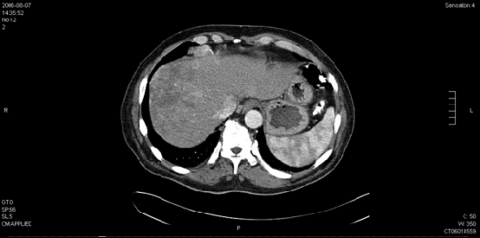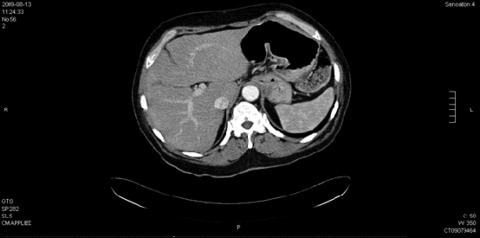CASE REPORT
A 54-year-old black man with chronic hepatitis C infection presented in August 2006 with a 1-month history of abdominal pain. His past medical history was significant for coronary artery disease, hypertension, dyslipidemia, peripheral neuropathy, and chronic lumbago. Medications included metoprolol, albuterol inhaler, oxycodone, hydrochlorothiazide, nitroglycerine, aspirin, gabapentin, doxazosin, ezetimibe, and cyclobenzaprine. He described his alcohol consumption as approximately 8 ounces of distilled spirits per month. Examination relieved multiple diffuse hypodense lesions in the right hepatic lobe with juxtadiaphragmatic lymphadenopathy on computed tomography (CT) scan (Figure 1). Laboratory analyses revealed alfa fetoprotein (AFP) elevated at 1,027 IU/mL, total protein 5.9 g/dL, albumin 2.7 g/dL, total bilirubin 0.9 mg/dL, alkaline phosphatase 64 IU/L, aspartate aminotransferase 124 IU/L, and alanine aminotransferase 59 IU/L.
Figure 1.
Computed tomography of the abdomen in 2006 demonstrates multiple hypodense lesions in the right hepatic lobe of the liver.
The patient underwent percutaneous biopsy of the liver lesions. Morphologic features on pathology were consistent with hepatocellular carcinoma (HCC) (Figure 2). The course was complicated by hemorrhage following liver biopsy, which was treated conservatively. Because of the extensive nature of the patient's disease and poor performance status, he was deemed inoperable and sent home to hospice care. Sorafenib therapy was not available at that time.
Figure 2.
Liver biopsy consistent with hepatocellular carcinoma.
The patient underwent a follow-up CT scan 2 months later, which showed no change compared with the previous study. Subsequently the patient was admitted multiple times for abdominal pain and narcotics overdose. He was also noted to have increased his alcohol consumption during this period. In July of 2008 he was admitted for pneumonia; CT scan showed decreased lesions in liver with calcification (Figure 3) and AFP levels were 1.5 IU/mL. No interim scans were performed between 2006 and 2008. At no time did the patient undergo any specific therapy for his HCC. Remarkably, his HCC went into spontaneous regression, and at the time of this report, his disease remains in remission.
Figure 3.
Computed tomography of the abdomen performed in 2009, demonstrating regression of the hepatic lesions.
DISCUSSION
Hepatocellular carcinoma is the fifth most common cancer in the world and ranks third in cancer mortality worldwide.1 In the United States, 22,620 new cases were estimated to be diagnosed in 2009, with 18,160 deaths expected due to HCC.2 Although 5-year mortality for early-stage cancer treated with curative intent continues to exceed 50%,3 advanced-stage disease continues to portend a dismal prognosis, with very few effective treatment options available. Median overall survival for advanced-stage disease in patients with good performance score and preserved liver function reserve is still less than 1 year, even with treatment.4 However, cases of spontaneous partial or complete remission of HCC have been reported, even in the setting of metastatic disease, with durable responses.
Spontaneous regression of HCC is a rare phenomenon, with fewer than 70 cases being reported in literature, and the reasons behind these remarkable occurrences remain a clinical mystery; however, gaining an understanding of the underlying mechanism behind this rare phenomenon could offer hope of finding new therapies that could be curative, even in advanced metastatic situations.
Spontaneous regression of a tumor has been defined as partial or complete disappearance of a malignancy in the absence of treatment or in the presence of therapy that is considered inadequate to exert any significant influence.5 Various causes for this phenomenon have been proposed in the literature, including abstinence from alcohol, androgen withdrawal, and herbal therapies.6 In a large series reported by Oquiñena, however, no possible etiology could be identified in the majority of patients undergoing spontaneous regression.7 Persistent fever,8 pain,9 and gastrointestinal bleed requiring transfusion10 are a few of the clinical events noted preceding spontaneous regression. A decrease in alpha-fetoprotein levels are known to be associated with this phenomenon.9
Of the possible etiologies proposed for spontaneous regression, ischemia is the most common. Tumors such as HCC with high metabolic rates are susceptible to spontaneous regression in conjunction with a sudden fall in hepatic blood flow.11 Rapid growth, arterioportal shunting, formation of a thick capsule, and portal vein thrombosis6 are all noted to support this. Formation of a thick capsule is thought to inhibit blood supply to the tumor.12
Immunologic mechanisms are the second most common proposed cause. The antigenic nature of AFP and immune response related to this in patients with HCC have been demonstrated.13 O'Beirne et al14 discuss the role of the immune system in controlling HCC with tumor-associated antigens, in this case AFP, being presented by dendritic cells for inciting immune response against tumor. These findings have led to the development of immunotherapy using dendritic cell vaccination for patients at risk of developing HCC. Case reports of partial spontaneous regression following intraperitoneal rupture with an immune response to disseminate tumor antigens as the cause of remission support this approach.15
Elevated interleukin 1816 and persistent fever preceding spontaneous response, with resected specimens showing severe inflammatory infiltration with lymphocytes in a pseudocapsule surrounding the tumor necrosis,8 have been observed. Infection inciting immunologic-mediated spontaneous remission of HCC has also been proposed.17 The inciting immunologic event might be triggered by treatment not directly related to cancer therapy. Ketoprofen, a COX inhibitor, has been proposed as a possible inciting agent in one case report.9 Interesting abscopal regression after radiotherapy to vertebral metastasis is found. In this case an increased level of tumor necrosis factor-alpha following irradiation was observed, indicating a possible immune mechanism.18
All patients previously reported with complete regression had poorly differentiated HCC. Hepatitis C was the most common cause of liver disease, and cirrhosis was present in approximately 60% of cases.19 However, regression as a whole is seen even in patients with well- to moderately differentiated tumors, negating pathology as a significant factor.10
Oquiñena et al in their analysis concluded that spontaneous regressions are frequently transient.20 But duration of regression varies in reported case reports, and survival of more than 20 years has been reported.21
In the present case, the patient had biopsy-proven HCC with elevated AFP. He was referred to hospice, given the extensive disease burden in liver and involvement of lymph nodes. He received no tumor-directed therapy to date. Although he had hemorrhaged following biopsy, repeat CT performed 2 months later revealed no changes. He had, in fact, increased his alcohol consumption to about a fifth of vodka per week and continued to experience abdominal pain for an extended period, requiring repeated admissions to the hospital. At the time it was noted that his HCC was in spontaneous remission, he had been admitted for pneumonia, and we are not aware of any serious infections occurring between his diagnosis and remission. His AFP had decreased at the time of remission, and he continues to do well 4 years after the diagnosis of HCC.
Spontaneous remission of HCC is a rare event, with an objective partial regression rate of 0.406% (95% confidence interval [CI] 0.067–1.043%) noted among patients in control or placebo arms.20 Not surprisingly, given the rarity of spontaneous remission, no guidelines regarding the management of these patients have been developed. Also, the varied survival rates in the literature make it difficult to predict a given course or even make generalized recommendations. Viable cancer cells have been found to be present in resected HCC following regression; hence, it has been proposed that HCC tumors in spontaneous remission ought to be treated as other HCC tumors, including resection, if possible, under suitable conditions.12
REFERENCES
- 1. Parkin DM, Bray F, Ferlay J, et al. : Global cancer statistics, 2002. CA Cancer J Clin 55:74–108, 2005 [DOI] [PubMed] [Google Scholar]
- 2. American Cancer Society: Cancer Facts and Figures 2009. Atlanta, GA: American Cancer Society, 2009 [Google Scholar]
- 3. Llovet JM, Burroughs A, Bruix J: Hepatocellular carcinoma. Lancet 362:1907–1919, 2003 [DOI] [PubMed] [Google Scholar]
- 4. Llovet JM, Ricci S, Mazzaferro V, et al. : Sorafenib in advanced hepatocellular carcinoma. N Engl J Med 359:378–390, 2008 [DOI] [PubMed] [Google Scholar]
- 5. Everson TC, Cole WH: Spontaneous regression of malignant disease. J Am Med Assoc 169:1758–1759, 1959 [DOI] [PubMed] [Google Scholar]
- 6. Lin TJ, Liao LY, Lin CL, et al. : Spontaneous regression of hepatocellular carcinoma: a case report and literature review. Hepatogastroenterology 51:579–582, 2004 [PubMed] [Google Scholar]
- 7. Oquiñena S, Iñarrairaegui M, Vila JJ, et al. : Spontaneous regression of hepatocellular carcinoma: three case reports and a categorized review of the literature. Dig Dis Sci 54:1147–1153, 2009 [DOI] [PubMed] [Google Scholar]
- 8. Markovic S, Ferlan-Marolt V, Hlebanja Z: Spontaneous regression of hepatocellular carcinoma. Am J Gastroenterol 91:392–393, 1996 [PubMed] [Google Scholar]
- 9. Del Poggio P, Matteillo M, Gilardoni L, et al. : The mysterious case of spontaneous disappearance of hepatocellular carcinoma. Dig Liver Dis 41(7):e21–25, 2009 [DOI] [PubMed] [Google Scholar]
- 10. Kondo S, Okusaka T, Ueno H, et al. : Spontaneous regression of hepatocellular carcinoma. Int J Clin Oncol 11:407–411, 2006 [DOI] [PubMed] [Google Scholar]
- 11. Herrera A, Erdozain JC, Molina E, et al. : Spontaneous regression of hepatocellular carcinoma. Am J Gastroenterol 91:1288–1289, 1996 [PubMed] [Google Scholar]
- 12. Ohtani H, Yamazaki O, Matsuyama M, et al. : Spontaneous regression of hepatocellular carcinoma: report of a case. Surg Today 35:1081–1086, 2005 [DOI] [PubMed] [Google Scholar]
- 13. Bei R, Budilon A, Reale MG, et al. : Cryptic epitopes on alpha-fetoprotein induces spontaneous immune responses in hepatocellular carcinoma, liver cirrhosis, and chronic hepatitis patients. Cancer Res 59:5471–5474, 1999 [PubMed] [Google Scholar]
- 14. O'Beirne JP, Harrison PM: The role of the immune system in the control of hepatocellular carcinoma. Eur J Gastroenterol Hepatol 16:1257–1260, 2004 [DOI] [PubMed] [Google Scholar]
- 15. Blondon H, Fritsch L, Cherqui D: Two cases of spontaneous regression of multicentre hepatocellular carcinoma after intraperitoneal rupture. Eur J Gastroenterol Hepatol 16:1355–1360, 2004 [DOI] [PubMed] [Google Scholar]
- 16. Abiru S, Kato Y, Hamasaki K, et al. : Spontaneous regression of hepatocellular carcinoma associated with elevated levels of interleukin 18. Am J Gastroenterol 97:774–775, 2002 [DOI] [PubMed] [Google Scholar]
- 17. Ohta H, Sakamoto Y, Ojima H, et al. : Spontaneous regression of hepatocellular carcinoma with complete necrosis: case report. Abdom Imaging 30:734–737, 2005 [DOI] [PubMed] [Google Scholar]
- 18. Ohba K, Omagari K, Nakamura T, et al. : Abscopal regression of hepatocellular carcinoma after radiotherapy for bone metastasis. Gut 43:575–577, 1998 [DOI] [PMC free article] [PubMed] [Google Scholar]
- 19. Randolph AC, Tharalson EM, Gilani N: Spontaneous regression of hepatocellular carcinoma is possible and might have implications for future therapies. Eur J Gastroenterol Hepatol 20:804–809, 2008 [DOI] [PubMed] [Google Scholar]
- 20. Oquiñena S, Guillen-Grima F, Iñarrairaegui M, et al. : Spontaneous regression of hepatocellular carcinoma: a systematic review. Eur J Gastroenterol Hepatol 21:254–257, 2009 [DOI] [PubMed] [Google Scholar]
- 21. McDermott WV, Khettry U: Clear cell carcinoma of the liver with spontaneous regression of metastases. J Surg Oncol 57:206–209, 1994 [DOI] [PubMed] [Google Scholar]





